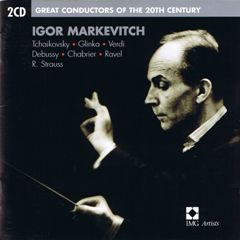Great Conductors of the 20th Century Vol.12 - Igor Markevitch
Great Conductors of the 20th Century Vol.12 - Igor Markevitch

Disc: 1 Tchaikovsky - Manfred Symphony In B Minor, Op.58 1. 1. Lento lugubre 2. 2. Vivace con spirito-Trio 3. 3. Andante con moto 4. 4. Allegro con fuoco Glinka - A Life For The Tsar (Excerpts) 5. Sinfonia. Adagio-Vivace 6. No. 5: Polonaise. Moderato 7. No. 6: Krakowiak. Allegro moderato 8. No. 6b: Waltz London Symphony Orchestra (1-4) Lamoureux Concerts Association Orchestra (5-8) Disc: 2 1. Verdi - La Forza Del Destino: Overture Debussy – La Mer (Trois Esquiesses Symphonique) 2. I. De L'Aube A Midi Sur La Mer (Tres Lent) 3. II. Jeux De Vagues (Allegro) 4. III. Dialogue Du Vent Et De La Mer (Anime Et Tumultueux) 5. Chabrier - Espana: Rhapsodie Pour Orchestre: Allegro Con Fuoco 6. Ravel - Daphnis Et Chloe (Fragments Symphoniques - 2e Serie): I. Lever Du Jour (Lent)/ II. Pantomime (Lent-Tres Lent-Vif-Tres Lent)/ III. Danse Generale (Lent-Anime) 7. R. Strauss - Till Eulenspiegels Lustige Streiche, Op.28: Nach Alter Schelmenweise - In Rondoform New Philharmonia Orchestra (1) Lamoureux Concerts Association Orchestra (2-4) Spanish Radio/TV Orchestra (5) North German Radio Symphony Orchestra, North German Radio Chorus (6) ORTF National Orchestra (7) Igor Markevitch – conductor
Igor Markevitch was one of the greats, as can be heard in the overdue reissue of Tchaikovsky’s Manfred Symphony that opens this set. (Markevitch’s Manfred previously was available on CD only as part of his excellent complete Tchaikovsky Symphonies with the London Symphony on Philips.) Once past Manfred though, EMI fails to present the conductor at his best.
If a hallmark of great conducting is the ability to make orchestras play not only well but idiomatically, then a prime example might be this Manfred, for Markevitch gets the LSO to emulate typically Russian timbres, with a depth to the string sound, paprika-sprinkled winds, and brazen brass not normally part of the orchestra’s palette. Throughout these discs you also feel a screw-tightening intensity to the point where at times the tension gets in the way.
Although this doesn’t entirely apply to the Manfred performance, in Markevitch’s hands the last movement’s infernal bacchanale is a true dance of the devils. He shapes the first-movement Astarte theme for muted strings with warmth, and the Alpine Fairy’s music in the second with elegant charm. Markevitch also was a master of eliciting orchestral colors, as we hear in the glinting winds of the second movement’s waterfall, and in the way climaxes are precisely weighted and colored. Manfred reveals another of the conductor’s traits: a degree of emotional distancing. So there’s no wallowing in Manfred’s first-movement sorrows, and his death elicits dry-eyed resignation. Finally, Markevitch’s mastery of rhythm and his insistence on precise articulation and transparent textures are all heard in abundance in this symphony. Well recorded at the time (1964) it still sounds good, and it’s still my favorite version of the work, although Maazel and, to a lesser extent, Muti, are reasonable alternatives. But neither matches Markevitch in revealing the structure of the lengthy first movement, which often sounds sprawling, or in making the second movement as danceable as the Tchaikovsky ballet scores it resembles.
Elsewhere, Markevitch’s intensity can be too much of a good thing. His 1959 La Mer for DG with the Lamoureux is a roiling, boiling sea, an impression exacerbated by the vivid but closely microphoned engineering. It’s marginally slower than such reference versions as Paray (Mercury), Munch (RCA), Boulez (DG), and Ansermet (Decca), but it sounds faster due to its volatility. A sense of menace is never really absent; you’re constantly reminded that bad things happen at sea. It’s a fascinating interpretation well worth knowing, but not, perhaps, one to return to often.
That feverish quality even infects so lighthearted a piece as Chabrier’s España and lends Strauss’ Till Eulenspiegel a grimness from which humor is absent. Markevitch’s Till is the polar opposite of Erich Kleiber’s mischievous imp heard on another Great Conductors release. It’s hard to believe that this is the same conductor who led a delightful Offenbach La Perichole (EMI) and a sparkling Satie Parade (Testament).
The second Suite from Ravel’s Daphnis et Chloé is heard in a live broadcast with a less-than-stellar German orchestra and chorus, and it’s inferior to Markevitch’s more relaxed and colorful 1954 Philharmonia version (Testament) without chorus. The Philharmonia is heard here in the Overture to Verdi’s La Forza del destino. The other sample of Markevitch’s opera conducting is the Overture and three Dances from Glinka’s A Life for the Tsar, drawn from a 1959 complete recording for EMI.
For Markevitch fans such as myself, this set is self-recommending, but I can’t help thinking about what might have been. The questionable selections might be excused on the grounds that its producers wanted to avoid duplication of material available elsewhere, including a terrific four-disc set in EMI France’s “les introuvables” series. So while the result gives a skewed slant to Markevitch’s discography, it’s definitely worth having for Manfred, the unorthodox La Mer, and the Glinka. Still, it’s frustrating to contemplate the missed opportunities to make this set really special. The notes say Markevitch’s first recordings as a conductor were of his own music made for French HMV in the late 1930s, and claim these performances show him already as an accomplished conductor–but there’s no explanation as to why those historically important recordings weren’t chosen for this set. And had Disc 2 been devoted to Markevitch’s Moscow performance of the Verdi Requiem released on a French Philips LP, this collection would have been not just interesting, but irresistible. --- Dan Davis, classicstoday.com
download:








